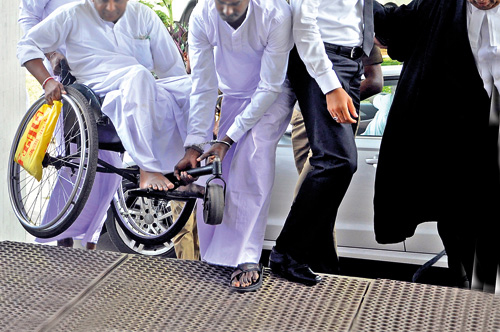News
Sign language acceptance deemed meagre rights recognition
Sign language will soon take the fourth place under the Official Languages Act in Sri Lanka, embracing hearing-impaired people into mainstream society, the Government said last week.
The National Secretariat for Persons Living with Disabilities (NSPD) said the Bill will be ready by 2023.
The Bill, when passed, will grant people living with disabilities, access to education, legal, health and other services from the Government.
Director Anuradha Herath said the draft bill presented in 2004 had gone through amendments in 2006 and in 2009.
Last week, the Government also allowed the Department of Motor Traffic to issue drivers’ licences to the hearing-impaired. Those with auditory impairment wearing hearing aids or cochlear implants, will be able to obtain a drivers’ license after a written examination and an aptitude test.
Around 76 people from Gampaha District received a learners’ permit from the Registrar of Motor Vehicles after a written examination.
However, the Disability Organisation Joint Front (DOJF) representing all institutions dealing with people with disability said the relief is too little, too late.
Project manager Nalinda Nagolla said the struggle for the rights of the 1.7 million less-abled persons has continued for over 15 years. The Disability Rights Bill is yet to make progress.
Sri Lanka signed the United Nations Convention for Rights of People with Disability (UNCRPD) in 2007 and ratified it in 2016.
A committee was appointed to draft the Bill in line with UNCRPD directive, in the same year, but successive governments have failed to pass it.
It is learnt that the draft bill had gone through several amendments at the Legal Draftsman’s office with revisions made up to 2021. The Bill had been tossed between the National Council for Persons with Disability (NCPD), the body appointed by the Government to draft the Bill and the Legal Draftsman’s office.
The DOJF and other non-governmental institutions representing the less-abled have been disappointed with changes to the Bill and have resisted the amendments.
DOJF project director Nalinda Nagolla charged that the NCPD’s membership had no gender balance and were all from Colombo. Moreover, the drafts were always made available in Sinhala and in English, for the only Tamil representative.
The timeline planned by the UNCRPD for the passage of the Bill was that the draft bill be available by April 2020 in alternative modes of communication, in braille and sign languages to enable feedback from less-abled people.
Approval was then to have been sought from the parliamentary sub committee by September, 2020 and be publicised as the Disability Persons Rights Acts by February, 2021.
Also, it was to have a mechanism to coordinate the implementation and have an independent monitoring system in line with UNCRPD article 33.
However, the Government was against any monitoring system as it feared the exposure of any violation of rights Mr. Nagolla said.
Now discussions are on to include a human rights action plan into the disability legislation, he said.
However, the National Secretariat for People with Disability (NSPD) said the delay in the passage was due to the DOJF insistence that a separate independent committee be appointed.
Director Anurudha Herath said that the existing council, the NCPD, is ready to monitor the process and was represented by all segments.
“The NCPD has 23 members with 12 members including the President, the line minister and the ministry secretary and the 11 members from institutions representing persons with disability.’’
The international centre for ethnic studies, in a publication, the ‘Disability Rights Bill’ authored jointly by Dr. Padmani Mendis and Dr. Binendri Perera pointed out that for 15 years the Bill has not been passed.

The Disability Rights Bill is yet to make progress
It says the way forward is public consultation and appropriate legislation and introducing an independent monitoring mechanism.
It points out that people with disabilities have been marginalised and denied full participation in society because of stagnation in implementing regulation to provide equal rights to a vulnerable population.
As of now, the only rights they have is under the Rights of Persons Act enacted in 1996. Under this, persons with disability have a right to education, employment and access to public places.
In conclusion, the article suggests that the Law Commission would better equipped to handle the draft bill given its complexity.
The best way to say that you found the home of your dreams is by finding it on Hitad.lk. We have listings for apartments for sale or rent in Sri Lanka, no matter what locale you're looking for! Whether you live in Colombo, Galle, Kandy, Matara, Jaffna and more - we've got them all!

